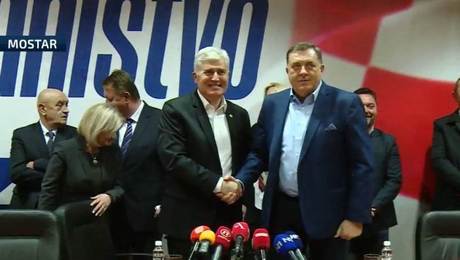Bosnia Leaders Agree to Form Government 10 Months after Poll

The leaders of Bosnia's three main parties reached an agreement Monday to form a central government, ending a 10 months-long impasse since elections in October 2018.
The heads of the ethnically-affiliated parties -- which represent Serbs, Croats and Bosnian Muslims (Bosniaks) -- signed the accord at a meeting facilitated by the head of the EU delegation to Sarajevo, Lars-Gunnar Wigemark.
One of the main stumbling blocks had been their divided stance towards NATO, with Serbs against joining the alliance while the other two parties are in favor.
Among a list of other points, the agreement includes a vague commitment to advancing the relationship with NATO.
EU spokesperson Maja Kocijancic welcomed the breakthrough as "an important step forward".
She urged the leaders "to proceed with the formation of authorities and to enable the regular functioning of all institutions without further delay."
After the meeting, Serb co-president Milorad Dodik, a hardline nationalist, warned the country had 30 days to make form the cabinet, known as the Council of Ministers.
"If the Council of Ministers is not formed within 30 days, this agreement will no longer be in force," he told reporters.
Since the end of its inter-ethnic war in the 1990s, Bosnia has been governed through a highly complex system of overlapping administrations that frequently leads to paralysis.
Lingering ethnic tensions and nationalism have also led to acrimonious politics.
The country is divided into two semi-autonomous regions, one dominated by Serbs and the other by Croats and Bosnian Muslims.
The two entities are linked by a weak central government, including a tripartite presidency shared by a Serb, Muslim and Croat member.



